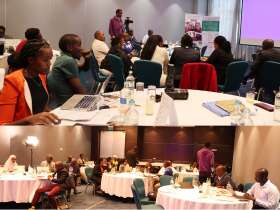
In Kenya, tuberculosis (TB) remains a pressing public health concern. Kenya is on the global list of countries with a high TB burden, with TB ranking as the 4th leading cause of death. According to the 2022 World Health Organisation (WHO) Global TB Report, 61% of TB cases reported are in men, 30% in women and 9% in children. Addressing this issue effectively requires a response to these gender disparities.
Several factors contribute to delayed TB diagnosis, treatment initiation and completion for men with TB. These include deeply rooted cultural and gendered norms (e.g. notions of masculinity, stigma and misconceptions); barriers at health care facilities (e.g. limited male-friendly services, inflexible opening hours, long waiting time, stigma, discrimination by healthcare workers, lack of privacy and confidentiality); and lack of social protection (e.g. entitlement to sick leave and job security) which heightens men’s concerns about losing their job and income. These challenges call for targeted gender-responsive approaches and strategies to TB prevention and care.
The Leaving no-one behInd: Transforming Gendered Pathways to Health for TB (LIGHT) research programme generates policy-relevant evidence with a focus on understanding and addressing the gender gap in TB transmission, diagnosis and treatment between men, women, and children.
On August 7, 2023, the LIGHT Consortium members in Kenya, comprising the African Institute for Development Policy (AFIDEP) and the Respiratory Society of Kenya (ReSoK), organised a consultative meeting with key stakeholders to explore, discuss and co-create potential pathways to address gender disparities for people with TB in Kenya. The meeting was also an opportunity to present LIGHT’s research plan, get feedback and foster prospects for uptake of research findings. The meeting was attended by 33 representatives from the Ministry of Health; National TB Programme (NTP); partner agencies including Centre for Health Solutions - Kenya (CHS), Stop TB Partnership- Kenya; and civil society organisations (CSOs) including legal, girls and women-leaning and masculinity-leaning CSOs. Also present were representatives of long-distance truck drivers and County TB and Leprosy Coordinators from selected counties with high burdens of TB (Machakos, Kiambu, and, Muranga).
In his opening remarks, Prof. Jeremiah Chakaya, Technical Director of ReSoK emphasised the complex intersecting factors that contribute to inequality, including gender, education, poverty, urbanisation and age. Dr Stephen Mulupi, also from ReSoK, highlighted how gender roles and social relationships influence health-seeking behaviours, access to health information and services, engagement, care, self-management, and access to social support.
Understanding these gender dynamics is critical for an effective response to TB. Some strategies were recommended to improve the men’s heath-seeking behaviour. These are continuous awareness campaigns, prepacked drugs to reduce waiting time, and taking services directly to men’s workplaces.
ReSoK established a new strategy for the Kenya Innovation Challenge (KIC-TB), funded by the Global Fund through AMREF in 2020. The new practice featured men-only workplace self-TB screening, with those testing positive connected to a facility of their choice to begin treatment.
Speaking at the event, Morris Maina, TB Leprosy and Lung Disease Coordinator in Nairobi County, acknowledged that the county has been able to sensitise and conduct TB screenings in up to 30 industries, as well as creating drop-in centres with community health volunteers for TB screening and diagnosis.
Promoting gender equity and women’s empowerment is also key in gender-responsive approaches to ending TB. This involves addressing social and cultural conventions that may hinder access to TB prevention and care. Maurine Murenga, Executive Director of Lean on Me Foundation/TB Women Global, noted that “Gender-responsive health education and awareness campaigns targeting women, their families, and communities to increase knowledge about TB prevention, symptoms, and available services is paramount.”
Understanding the political and economic context hindering access to and successful treatment for TB among men in Kenya is crucial for influencing government funding and budget allocation for gender-responsive TB interventions. Dr Leyla Abdullahi, Senior Research and Policy Analyst at AFIDEP, emphasised LIGHT’s collaborative work with Kenya’s TB stakeholders to co-create a policy implementation plan and advocate for more resources towards gender-responsive interventions such as outreach programmes in places of employment to address barriers to TB diagnosis and care faced by men.
The consultative meeting highlighted ongoing efforts being made to end TB in Kenya, such as improving the country’s health infrastructure and systems. However, the need to accelerate these efforts and review/revisit/reform policies and legal frameworks affecting TB access and care was also acknowledged. The meeting brought out conversations related to enhancing the understanding and framing of gender, including the need to integrate evidence-informed approaches applicable not only to men but also to women and girls and people of all genders. It stressed the importance of community engagement and creating awareness campaigns in close collaboration with local community groups and civil society organisations, as well as cultivating non-stigmatising language that unfairly blames men for TB transmission.
Stakeholders expressed interest to remain engaged with LIGHT’s research. LIGHT will plan regular opportunities for greater stakeholder engagement and provide updates on research progress and key findings. These collaborative efforts offer hope for a more gender-equitable approach to TB prevention and care in Kenya.
